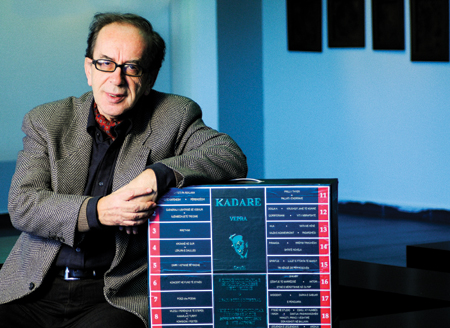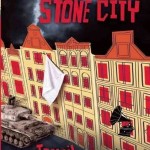
Iva Gjoni
After the fall of Enver Hoxha’s monument in Tirana’s main square, I looked through my grandfather’s personal library and found various manuscripts, which, I knew, were valuable. He had translated the works of Greek and Latin classics and used to tell me that they would not be published in the then-communist Albania. I always thought about his words and, around 1995, five years after Albania had become a democratic country, with a notebook in my hand (one of those notebooks that had been sold in the past and cost only 16 lek) I headed toward Onufri Publishing House, whose office at the time, I remember, was located near Lidhja e Shkrimtareve (Writer’s Association Center) in Tirana. I had spoken with other publishers but had not liked their responses. In fact, the last time I had tried something like this, carrying with me the original manuscript of Oedipus Rex by Sophocles (translated from ancient Greek into Albanian by Henrik Lacaj), two publishers, whose names I do not want to mention, kept playing chess as I waited in the hallway to speak to them.
So I took Ovid’s Metamorphoses because its lines were magical—lines I had read and re-read so many times when my grandfather was translating this work. At that time I was his only reader and every time I read, I asked him, “But why, why don’t they publish them? These stories are amazing!” He didn’t explain but quietly put them away in a drawer. So, carrying Metamorphoses and hoping for a real metamorphosis, I knocked at Onufri’s office door. Its founder, Bujar Hudhri, wasn’t in yet (he commuted each day from Elbasan to Tirana) and I was politely asked to sit and wait. I didn’t know then that we would eventually develop such important business relations that Bujar would publish almost all the works translated by Henrik Lacaj, showing a unique respect for the translator and his work; Bujar would call Henrik “the idealist translator” and, later, while working with David Hosaflook to publish the first English translation of Rrethimi i Shkodres (The Siege of Shkodra) based on Lacaj’s translation, he would call David another “idealist translator.”
I remember very well that I was welcomed and hopeful that my requests and manuscripts would be taken seriously. I was scared of the Albanian “businessmen” of that time because I knew that all they cared about was money. My conversation with Bujar Hudhri helped me regain my belief that there are nice, honest people who don’t care only about money but who value real art and culture and have good intentions and work for their advancement.
My apprehension was heightened because I was only a twenty-year old who was approaching a publishing house with only an old notebook, written in handwriting, not having the possibility to copy the work on the computer or even to type it on a typewriter. I was scared that if I left the manuscript with the publisher, it would get lost and, instead of helping my dead grandfather, I would accomplish the opposite. I was scared and wanted only one thing: to find a publisher who loved and knew literature so that he would understand the cultural and literary value of such works. This was exactly what happened with Bujar Hudhri.
More than fifteen years have passed since my introduction to Onufri and nothing has changed. After publishing for the first time in Albanian Oedipus Rex (Sophocles), Metamorphoses (Ovid), Aminta (Torquatto Tasso) and Rrethimi i Shkodres (Barleti, along with Hosaflook’s translation of it into English, The Siege of Shkodra), Onufri promises to publish a collage of Lacaj’s translations.
The publishing house Onufri began its work around the year 1992 by publishing Albanian classics and later Italian and English masterpieces. Ismail Kadare says about Onufri, “I have chosen Onufri as my publisher now and in the future, from amongst many other Albanian publishers. He [Bujar Hudhri] seemed to me a serious publisher but, most importantly, he seemed to me that his driving force was not greed for money, which, unfortunately, is common in present-day Albania and in Eastern Europe. But he is some kind of an idealist, too, in the way he sees things.”
Some of the works published by Onufri are Kadare’s works, Helena Kadare’s Kohё e pamjaftueshme (Not Enough Time), Camaj’s works, selected works of Shakespeare, translations of Greek and Latin classics by Henrik Lacaj, Albania Retrovata (Albania Refound) by Lucia Nadin and, recently, the prestigious re-publishing of The Siege of Shkodra translated from Latin into Albanian by Henrik Lacaj and its first English translation by David Hosaflook (based on Lacaj’s translation). This list reveals Bujar Hudhri’s character—he chooses works that fill the gaps in Albanian literature and culture and enrich them. Driven not by the desire for personal gain but by the desire to leave an imprint upon Albanian culture, Bujar Hudhri has remained loyal to his noble goal, honoring the name he chose for his publishing house, that of the famous painter Onufri.
I hope and wish that Onufri will continue its amazing and much needed work, further enriching our literature by publishing similar masterpieces, thus walking on the same path as Kadare, Noli, Koliqi, Camaj, Fishta, and Barleti, whose sole purpose was the advancement of Albanian language, culture, and literature.
For more information about Onufri see www.Onufri.com or email [email protected].




